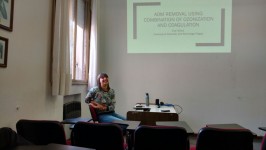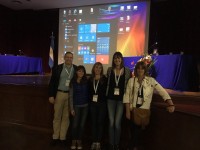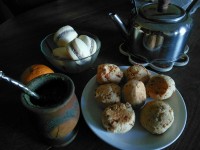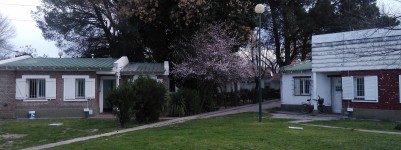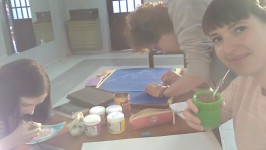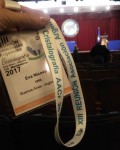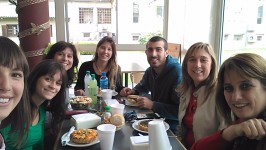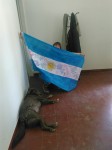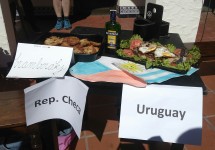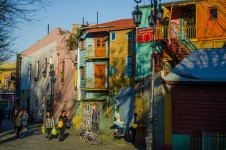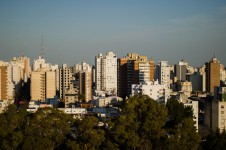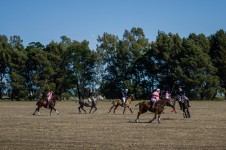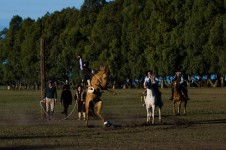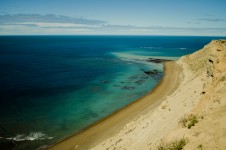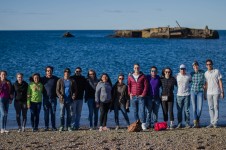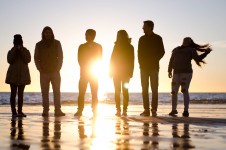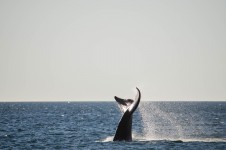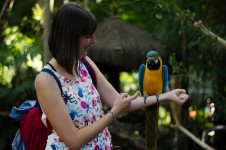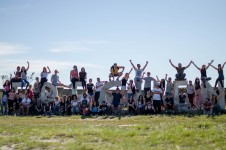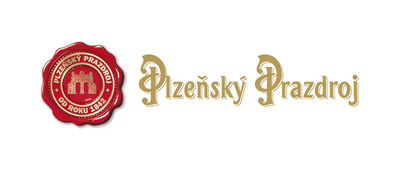⬅ zpět na info
Uveřejněné zprávy z praxí neprošly ani jazykovou ani textovou úpravou. Proto, prosím, omluvte chybějící „hacky a carky“, stylistické a gramatické nedokonalosti textů.
MSc. Eva Ničová, UCT Prague, ročník 5
About the country
Location of the place
Bahía Blanca is a city in the Buenos Aires province. It is still 500 km away from Buenos Aires, 10 hours by bus. The city has approx. 300 000 inhabitants and it is located on the coast, but don't expect any beaches - just industry and a big harbour. The university is not in the centre of the city, but I would say the neighbourhood is nicer and more pleasant than the centre. It is cleaner and less busy, all the university facilities and the accomodation are very close and there are a lot of bars, restaurants, shops and a big park.
City
I think Bahía Blanca is a very nice city, compared to the other ones I have visited. There is not that much poverty and it is more or less clean and organised. From the touristic point of view there is not that much to do, but it is a very pleasant place to live, you will find everything you need there. There is a big park, where you can go jogging or work out, there is a lot of beer bars selling artesanal beer, clubs to go out (the best one is just 1 minute walking from the accomodation), city centre with a lot of shops and facilities you might need. In Argentina, including Bahía, it is completely normal to meet stray dogs in the streets, who don't have owners and go everywhere, including the university, classes, canteen, student houses, banks, shops etc. Don't worry, they are friendly to people and there were never any problems. If you are scared of dogs, it might be a shock for you, though :).
Surroundings (possible trips, ...)
Bahía Blanca is in the middle of the huge and flat area called pampa, so unfortunately all the beautiful natural wonders of Argentina are quite far away. 30 minutes away is the harbour town called Ingeniero White. It is a nice half-day trip, with two museums to visit, old abandoned castle and a lot of ships. 1,5 hours away is a mountain range, where you can do small camping and hiking trips (Sierra de la Ventana, Napostá, Estancia Funke, Cerro Tres Picos..). 3 hours drive away you can visit the abandoned ghost town of Epecuen. In the province there are a lot of campos (farms) where you can go to see the typical gaucho lifestyle, ride horses etc. You can also visit the beaches of Pehuén-Có and Monte Hermoso, that are 1,5 hours away from the city. To all the famous points of interest in Argentina you need to travel by long distance buses, rented cars or planes. I highly recommend to visit the city of Puerto Madryn and nearby Peninsula Valdés, where you can spot whales, penguins, orcas, sea dogs, llamas and many more animal species and visit beautiful beaches. We rented cars to get there, the drive took us cca 7 hours. Buenos Aires is also considered to be "close", 10 hours by bus (Argentina is really really big). The city might seem like a huge mess on the first sight, but if you give it a second chance, you can actually start liking it, which happened to me. Discover the history and culture, tango, street art, cafés, parks, people and food. Other places accessible by bus from Bahía are Mendoza, Córdoba or Bariloche, which was one of my favourite places. It is a cool city in the middle of the Andes, surrounded by blue lakes and hiking trails, well connected by the city's public transport. If you are planning to visit Iguazú, Southern Patagonia or Salta, I recommend taking a plane, as buses would probably take you 2 days or more. Bahía Blanca has an airport.
Employer
Employer
Universidad Nacional del Sur, the Chemistry department.
Work description
I worked in a small laboratory with my supervisor and her colleague, who also had an intern from Serbia. Sometimes there were more students or teachers working with us, so the lab was quite lively. The working environment was very friendly and the professors were always willing to explain new things to me. My task was to synthesize complexes of nickel, thiosaccharine and other organic ligands. The aim was to obtain crystals of these complexes. If we succeeded, we analysed the crystals further, using various methods, such as the IR analysis. I also learned how to prepare thiosaccharine. My supervisor organised a lot of guided visits for me, in other labs at the university or in the CONICET research centre of Bahía Blanca. Me and the Serbian student helped our supervisors prepare and organise the annual meeting of the Crystalographic Asociation of Argentina. We were also allowed to take part in a course of X-ray difractometry (held in Spanish), which was a very valuable experience for the both of us. The department asked us to give a presentation about our diploma theses, home universities and countries. The whole department was invited and we had interesting discussions. In general, I am very glad I took part in this internship. Even though it was very different from what I studied in my master in the Czech Republic, it was a very valuable experience and I didn't have problems with learning about the new topics. The supervisors were very friendly even outside of work, one of the professors invited me and my Serbian colleague to her house, where her husband prepared typical asado for us and the whole family. My supervisor organised a goodbye lunch for me and also put me in contact with her friends, who went hiking every weekend, so that I could join them. Another two professors, who had IAESTE interns too, invited all of us interns from the chemistry department and our Argentinian colleagues to their beach house in Monte Hermoso for a day and prepared a big asado for everyone.
Salary (sufficient for local conditions?)
The salary was 4200 ARS per month, which is not really much. Argentina is very expensive, even food you buy every day in a supermarket. Since the accomodation was (almost) free for me, the salary was enough for living in Bahía Blanca - buying food, sometimes a beer; I almost never ate out in restaurants. The good thing is I didn't really need to use public transport, most of the things are in walking distance. The salary didn't cover the expenses for my journey and for the bigger trips I did during and after the internship. They say the accomodation is covered, so you don't have to pay, in fact I had to pay a 1000 ARS deposit for the house and in the end they only gave me back 500 ARS, even though everything was fine in the house. They say the 500 ARS is a fee for cleaning, but the house definitely didn't look like it had been cleaned before I and the other students arrived.
Language requirements
Good English, Spanish was not needed. My supervisor spoke very good English, but in general people in South America don't speak English very well or at all. I arrived with almost zero knowledge of Spanish, but I expected to need it, so I learnt a little bit before, just to have an idea and know some phrases. It was definitely a good idea. Most of the international student (except for the other IAESTE interns) didn't speak English, neither did most of the people I used to meet every day. People in banks, shops, university, bus stations, airports. It was hard in the beginning but it helped me learn Spanish very very fast. I shared my house with 7 students, mostly from South America, who spoke Spanish to each other. It definitely helped me improve the language the most. There were also Spanish classes available for us. It was a good opportunity to practise Spanish and meet the other students.
Accommodation (price, who provided it)
I stayed in a little house, or a bungalow, with 7 students from other countries, who were also on an exchange. We were 4 girls and 4 boys. The house had a small, old, badly equipped kitchen, big dinning/living room with a huge table and a lot of space, 2 bathrooms (one for girls, one for guys), and 4 bedrooms, each for 2 people. No washing mashine!!! (You can use public laundry services or ask your friends, if you want to save money). The bedrooms were tiny, with just 2 beds, one wardrobe and one table. There was not enough space to store our things. As I wrote above in the Salary section, the living was basically free for me. The house was not the best but definitely not a disaster, we got away with a little bit of respect and creativity. Don't expect anything super clean :). Even though the house was not perfect, we had a great time with the roommates and we made friendships that last for life. There were more similar houses around for internationals, and also a residential building for Argentinian students, with a typical barbecue and a nice space in the middle to hang out. All the international students and some locals were like a big family and we always hung out together and visited each other in the houses. The houses are located 5 minutes walking from the main university building (where I worked), 10 minutes walking from a big supermarket and right next to a big park with a lot of sport opportunities.
Social life
Meeting IAESTE members (pick-up at the airport, organized events...)
I don't think there is an IAESTE group in Bahía Blanca. I got a contact for an IAESTE office in Buenos Aires. I sent an email to ask about some issues but they basically told me I needed to organise everything myself, the journey to Bahía, the pick-up etc. I don't even think they are in touch with the University in Bahía. Luckily, the university has got an international office, with very helpful staff, who speak English, and also there is a student organisation called CAAI, which organises a LOT of events (parties, trips, beerpong tournament or a day of typical foods of each country, which was especially nice). They also provided everyone with a Buddy - a local student, who was always ready to help. My Buddy picked me up in the bus terminal, drove me to my place, helped me with a lot of things and we shared dinners in her house with the whole family. In general, I was very happy with the organisation - there were 92 foreign students and interns in total. Before arriving to Argentina, the CAAI contacted all of us by email, invited us to join a Facebook and a Whatsapp group, where we were able to ask anything we wanted. All the local students were extremely friendly and helpfull. The international office cooperated with the CAAI and they also organised 2 trips during the semester - a beach day and an agricultural exposition in a village in the pampa, where we were able to meet the real argentinian "gauchos" and taste "asado" - the barbecue the Argentinians are so proud of.
Meeting other foreign students
Very very easy - a big group of us lived together in the little bungalows next to each other. All the IAESTE interns (in total maybe 10) as well. More of them I was able to meet in the Spanish class and the class of the Argentinian Culture, that we were allowed to attend for free. The rest of the students we met at the welcome party and the other events. The city is small, I used to meet people I knew all the time.
Sport and culture
Next to the houses there is a big park where you can go jogging or working out. There are also pitches to play basketball etc. The university has a club where you can do almost any kind of activities. It is very cheap to join the club and you can pick whichever classes you like. I definitely recommend tango, which is a significant part of Argentinian culture, I used to go with many international students. One Sunday the teacher took us to a "milonga", a place to dance tango. Apart from tango I used to attend painting classes, which were great. There is much more though, like photography, zumba, any kind of sports, gym...
I definitely recommend taking the classes of the Argentinian culture. Even though they are held in Spanish, they were very contributional to me. The teacher is young and she speaks very slowly and makes sure everyone understands her. We talked about maté, tango, lunfardo (the language typical for Buenos Aires), gestures, literature, street art, music... She also organised some guided tours in the city parks, in the theatre, in a gallery. She always told us about interesting concerts and events and sometimes we went together with her. The classes were very liberal, we were all allowed to talk and ask about anything that could possibly come to our minds and we ended up having interesting discussions about our cultures. I learned a lot about the complex history of Argentina and the European influence on it.
I definitely recommend taking the classes of the Argentinian culture. Even though they are held in Spanish, they were very contributional to me. The teacher is young and she speaks very slowly and makes sure everyone understands her. We talked about maté, tango, lunfardo (the language typical for Buenos Aires), gestures, literature, street art, music... She also organised some guided tours in the city parks, in the theatre, in a gallery. She always told us about interesting concerts and events and sometimes we went together with her. The classes were very liberal, we were all allowed to talk and ask about anything that could possibly come to our minds and we ended up having interesting discussions about our cultures. I learned a lot about the complex history of Argentina and the European influence on it.
Food, local specialties
Food was very expensive for me. I never bought ham or cheese, the price was too high. The cheap things were veggies and meat. I feel like in Argentina they don't like to use spices as much as we do, I missed them a lot, together with some dairy products typical for my country, but I expected that. There are many different things typical for Argentina though. Don't be afraid to try them. You can eat in the school canteen, "comedor", which is very cheap, but not that great. They serve lunch, dinners and even breakfasts. The price is always 20 ARS with your student card and they offer vegetarian menu as well as menu for celiacs (the vegetarian menu was usually better than the normal one). The meal comprised a kind of meat (milanesa, hamburguesa, chicken breast), side dish (pasta, rice or potato puré), salad, small piece of bread, mayonese, orange and a glass of water. It was always very similar, the quality was not the best, and a lot of people said the portion was too small. For me the amount was OK, but I couldn't eat there often, because it was not so good. I sometimes cooked in the house and sometimes went to eat in the comedor. It is also a good place to meet your friends or to watch football matches :). In the houses for the international students we did a lot of dinners together. It was great to taste many different cuisines.
What you need to try in Argentina is maté (more a social habit than a drink), beef steaks, asado, empanadas, dulce de leche, alfajores, ice cream (the ice cream is delicious and very sweet and there are many ice cream deliveries working until late night, which is a disaster, if you are trying to stay fit :)) and wine from Mendoza or Cafayate... My favourites were definitely empanadas and alfajores, which I would describe as cookie sandwiches, filled with dulce de leche, with different toppings. Try the artesanal ones in Havanna café or the ones made of maisena (corn flour). Argentinians are also very proud of their pizza and pasta, because of the Italian influence brought by the immigrants, but I don't think they are very good.
What you need to try in Argentina is maté (more a social habit than a drink), beef steaks, asado, empanadas, dulce de leche, alfajores, ice cream (the ice cream is delicious and very sweet and there are many ice cream deliveries working until late night, which is a disaster, if you are trying to stay fit :)) and wine from Mendoza or Cafayate... My favourites were definitely empanadas and alfajores, which I would describe as cookie sandwiches, filled with dulce de leche, with different toppings. Try the artesanal ones in Havanna café or the ones made of maisena (corn flour). Argentinians are also very proud of their pizza and pasta, because of the Italian influence brought by the immigrants, but I don't think they are very good.
Other information
Possibilites to communicate with the Czech Republic
There was Wi-Fi in the house. It was not very fast but it was enough. However, as my roommates were on a study exchange and needed to use internet much more than me, they decided to buy a new router from another provider. It was not expensive. The university and comedor also had Wi-Fi, which was a bit better.
Recommendations for students who will go to the same place
GO! It was one of the most interesting things I have ever done. I learned something new, made many friends and on top of all that, I learned a new language. I experienced a little culture shock (I am meaning it in a positive way), because South America and its mentality is very different. There is so much history, culture and music to discover. Save some extra time and money so that you can visit more places in Argentina (or even South America), as it is a very big country offering many beautiful places to explore. If you don't use Whatsapp, I recommend to get it - we always organised things with the students and the CAAI, you can even use it to call taxi or reserve a table in a bar. Even my supervisor used it to communicate with me.
What not to forget with you
Gifts typical for your country for the supervisor, Buddies, roommates, local students, couchsurfing hosts.. Magnets, postcards, typical sweets, beverages.. You can even bring the flag of your country, you will definitely use it during sport and cultural events. If you are planning to sleep sometimes and not only party, bring earplugs :). I used them basically every night as the houses were always lively and two clubs are very close. Also, there were no bed sheets for me, had to bring my own. If you like outdoor activities, bring the equipment and durable shoes. In Bahía there are big differences between the temperatures in the day and night, so don't forget some warm jacket. There is also a lot of wind. By the way, clothes are very expensive in Argentina! Some students, who like cooking, even brought their own pans or other cooking gadgets, as they knew the kitchen wasn't going to be very good. Camera is a must.
Benefits of the internship
Great work experience. Spanish, friendships, horizons broadened.
Cooperation with IAESTE in the foreign country
IAESTE was only in Buenos Aires. They always answered my emails, but did not really help. The university and CAAI in Bahía were very helpful though.
Overall experience with IAESTE
I had to wait for a very very long time to obtain my acceptation email, even though IAESTE avised it would take more or less a month. Instead, I had to wait for more than 2. Other than that, IAESTE works very well, I am grateful to have traveled so far, to such an interesting country. The experience was very valuable.
Student's website
--
Employer's webiste
https://www.uns.edu.ar/
Other useful links
https://www.plataforma10.com.ar/ - buses in Argentina
Flight companies:
http://www.aerolineas.com.ar/Welcome
https://www.latam.com/es_ar/
https://www.andesonline.com/
https://www.turismocity.com.ar/ - You can find cheap flights and travel packages on this website, but I didn't really succeed to buy them through the platform, as I was not a resident - I still used it sometimes, to have an idea
http://www.spanishdict.com/ - downloaded a smartphone app, helped me a lot with everyday Spanish
www.couchsurfing.com - worked very well
Flight companies:
http://www.aerolineas.com.ar/Welcome
https://www.latam.com/es_ar/
https://www.andesonline.com/
https://www.turismocity.com.ar/ - You can find cheap flights and travel packages on this website, but I didn't really succeed to buy them through the platform, as I was not a resident - I still used it sometimes, to have an idea
http://www.spanishdict.com/ - downloaded a smartphone app, helped me a lot with everyday Spanish
www.couchsurfing.com - worked very well
Other comments
If you want to ask me anything, send me an email - [email protected]
